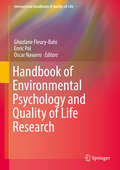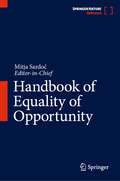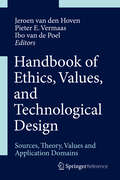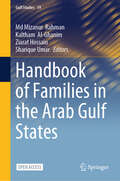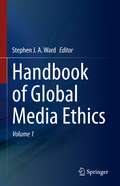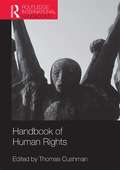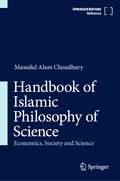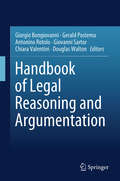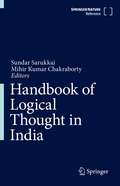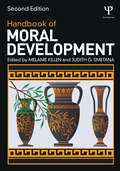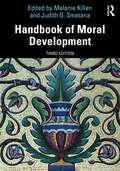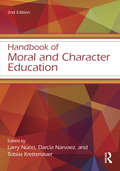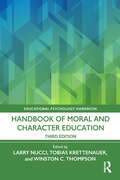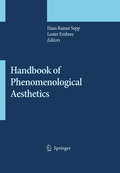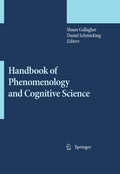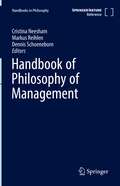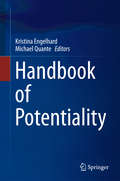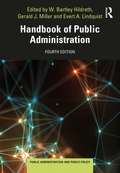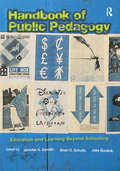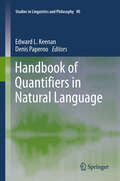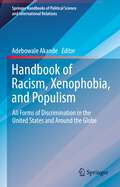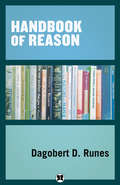- Table View
- List View
Handbook of Environmental Psychology and Quality of Life Research
by Ghozlane Fleury-Bahi Enric Pol Oscar NavarroThis Handbook presents a broad overview of the current research carried out in environmental psychology which puts into perspective quality of life and relationships with living spaces, and shows how this original analytical framework can be used to understand different environmental and societal issues. Adopting an original approach, this Handbook focuses on the links with other specialties in psychology, especially social and health psychology, together with other disciplines such as geography, architecture, sociology, anthropology, urbanism and engineering. Faced with the problems of society which involve the quality of life of individuals and communities, it is fundamental to consider the relationships an individual has with his different living spaces. This issue of the links between quality of life and environment is becoming increasingly significant with, at a local level, problems resulting from different types of annoyances, such as pollution and noise, while, at a global level, there is the central question of climate change with its harmful consequences for humans and the planet. How can the impact on well-being of environmental nuisances and threats (for example, natural risks, pollution, and noise) be reduced? How can the quality of life within daily living spaces (home, cities, work environments) be improved? Why is it important to understand the psychological issues of our relationship with the global environment (climatic warming, ecological behaviours)? This Handbook is intended not only for students of various disciplines (geography, architecture, psychology, town planning, etc. ) but also for social decision-makers and players who will find in it both theoretical and methodological perspectives, so that psychological and environmental dimensions can be better taken into account in their working practices.
Handbook of Equality of Opportunity
by Mitja SardočThis Handbook provides an authoritative exposition of equality of opportunity. It presents the different concepts most commonly associated with equality of opportunity, and discusses the many problems dominating the controversies on equality of opportunity at the theoretical, policy or practical level. The chapters give a concise exposition of the different conceptions and basic concepts of equal opportunities. They clarify variables that are part of the 'algorithm of equal opportunities', e.g. opportunity, equality, non-discrimination, fairness, responsibility, chance and choice, excellence, qualifications, effort, talent, merit, desert, inequality, and risk. The idea of equality of opportunity has traditionally been associated with a set of largely unquestioned ideals, and over the last 50 years, it has been at the very centre of the major progressive social changes and firmly entrenched in political rhetoric. Yet, the idea of equality of opportunity is far from unquestionable or unproblematic as the only solid assumption different conceptions have in common is their rejection of fixed social relations but not hierarchy itself. Disagreements over the fundamental principles, criticism over the inefficiency of policies aiming to ensure equal opportunities, and objections to their unfairness, all pose questions that current conceptions answer in different ways. This Handbook examines a wide variety of questions about issues of motivation, procedures, genealogy, taxonomy, and compensation.
Handbook of Ethics, Values, and Technological Design
by Ibo van de Poel Pieter E. Vermaas Jeroen van den HovenThis handbook enumerates every aspect of incorporating moral and societal values into technology design, reflects the fact that the latter has moved on from strict functionality to become sensitive to moral and social values such as sustainability and accountability. Aimed at a broad readership that includes ethicists, policy makers and designers themselves, it proffers a detailed survey of how technological, and institutional, design must now reflect awareness of ethical factors such as sustainability, human well-being, privacy, democracy and justice, inclusivity, trust, accountability, and responsibility (both social and environmental). Edited by a trio of highly experienced academic philosophers with a specialized interest in the ethical dimensions of technology and human creativity, this syncretic handbook collates an array of published material and offers a studied, practical introduction to the field. The volume addresses myriad aspects at the intersection of technology design and ethics, enabling designers to adopt a constructive approach in anticipating, preventing, and resolving societal and ethical issues affecting their work. It covers underlying theory; discrete values such as democracy, human well-being, sustainability and justice; and application domains themselves, which include architecture, bio- and nanotechnology, and military hardware. As the first exhaustive survey of a field whose importance is characterized by almost exponential growth, it represents a compelling addition to a formerly atomized literature.
Handbook of Families in the Arab Gulf States (Gulf Studies #19)
by Md Mizanur Rahman Ziarat Hossain Kaltham Al-Ghanim Sharique UmarThis open access book collates and advances the body of knowledge about the factors, directions, and magnitudes of change in Arabian Gulf families from interdisciplinary perspectives. Family life across the globe is being impacted by unprecedented diversity in household living arrangements and by sweeping economic, cultural, and social change, and this is not an exception in the Gulf region. The book demarcates how Gulf families are experiencing many formidable challenges and undergoing profound changes due to speedy economic transformation, educational reforms, extensive use of social media, rapid urbanization, migration, women empowerment, and the intersections of popular culture from both the East and the West. Notwithstanding such challenges and changes, Gulf families often seem to retain and continue many of the traditional roles and functions of families in a sustained manner. It contributes to current debates that revolve around questions of what has changed, and what has stayed the same, in family structures in the region. Sweeping and comparative, the book provides avenues for offering practical solutions for policy interventions in Kuwait, the United Arab Emirates, Qatar, Bahrain, Oman, and Saudi Arabia. It is a key academic text for sociologists interested in transformations in the family in relation to politics, economics, consumption patterns, education, gender, law, social media, religion, culture, social reforms, and the state.
Handbook of Global Media Ethics
by Stephen J. A. WardThis handbook is one of the first comprehensive research and teaching tools for the developing area of global media ethics. The advent of new media that is global in reach and impact has created the need for a journalism ethics that is global in principles and aims. For many scholars, teachers and journalists, the existing journalism ethics, e.g. existing codes of ethics, is too parochial and national. It fails to provide adequate normative guidance for a media that is digital, global and practiced by professional and citizen. A global media ethics is being constructed to define what responsible public journalism means for a new global media era. Currently, scholars write texts and codes for global media, teach global media ethics, analyse how global issues should be covered, and gather together at conferences, round tables and meetings. However, the field lacks an authoritative handbook that presents the views of leading thinkers on the most important issues for global media ethics. This handbook is a milestone in the field, and a major contribution to media ethics.
Handbook of Human Rights (Routledge International Handbooks)
by Thomas CushmanIn mapping out the field of human rights for those studying and researching within both humanities and social science disciplines, the Handbook of Human Rights not only provides a solid foundation for the reader who wants to learn the basic parameters of the field, but also promotes new thinking and frameworks for the study of human rights in the twenty-first century. The Handbook comprises over sixty individual contributions from key figures around the world, which are grouped according to eight key areas of discussion: foundations and critiques; new frameworks for understanding human rights; world religious traditions and human rights; social, economic, group, and collective rights; critical perspectives on human rights organizations, institutions, and practices; law and human rights; narrative and aesthetic dimension of rights; geographies of rights. In its presentation and analysis of the traditional core history and topics, critical perspectives, human rights culture, and current practice, this Handbook proves a valuable resource for all students and researchers with an interest in human rights.
Handbook of Islamic Philosophy of Science: Economics, Society and Science
by Masudul Alam ChoudhuryThis handbook provides a comprehensive overview of Islamic ethical issues within a wide spectrum of philosophy of science topics, examining the development of the model of moral inclusiveness in economics, science and society from ontological, epistemological and analytical perspectives. This paradigm takes the view that ethics is systemically endogenous, and can be studied by the most rigorous scientific analysis pertaining to diverse issues and problems of ethicality in socio-scientific inquiry. This handbook takes a sweeping transdisciplinary approach that is deeply phenomenological, to the nature and logic of scientific inquiry of, and in, the Qur’an. Such an approach invokes the episteme of the unity of knowledge in the socio-scientific systemic sense. The volumes' respective sections focus on the nature, logic, and role that ethics plays in formulating new vistas of alternative epistemic futures in Islamic economics, finance, and the social sciences. The ideas presented are situated within the broader context of the post-modernist, post-pandemic, and the post-Covid-19 epoch, while being aimed at conceptualising a distinctive new outlook of transdisciplinary intellection in Islamic philosophy. The content is rigorously conceptual, qualitative, quantitative, and applied. Covering a diversity of subject areas from philosophy of science, to economics and in socio-scientific context within the realm of Islamic philosophy, this forms a key text for scholars in these respective arenas, led by pioneering scholarship in Islamic studies.
Handbook of Legal Reasoning and Argumentation
by Douglas Walton Giovanni Sartor Antonino Rotolo Giorgio Bongiovanni Gerald Postema Chiara ValentiniThis handbook addresses legal reasoning and argumentation from a logical, philosophical and legal perspective. The main forms of legal reasoning and argumentation are covered in an exhaustive and critical fashion, and are analysed in connection with more general types (and problems) of reasoning. Accordingly, the subject matter of the handbook divides in three parts. The first one introduces and discusses the basic concepts of practical reasoning. The second one discusses the general structures and procedures of reasoning and argumentation that are relevant to legal discourse. The third one looks at their instantiations and developments of these aspects of argumentation as they are put to work in the law, in different areas and applications of legal reasoning.
Handbook of Logical Thought in India
by Sundar Sarukkai Mihir Kumar ChakrabortyThis collection of articles is unique in the way it approaches established material on the various logical traditions in India. Instead of classifying these traditions within Schools as is the usual approach, the material here is classified into sections based on themes ranging from Fundamentals of ancient logical traditions to logic in contemporary mathematics and computer science. This collection offers not only an introduction to the key themes in different logical traditions such as Nyaya, Buddhist and Jaina, it also highlights certain unique characteristics of these traditions as well as contribute new material in the relationship of logic to aesthetics, linguistics, Kashmir Saivism as well as the forgotten Tamil contribution to logic.
Handbook of Moral Development
by Judith G. Smetana Melanie KillenThe Handbook of Moral Development is the definitive source of theory and research on the development of morality. Since the publication of the first edition, ground-breaking approaches to studying the development of morality have re-invigorated debates about what it means to conceptualize and measure morality in early childhood, how children understand fairness and equality, what the evolutionary basis is for morality, and the role of culture. The contributors of this new edition grapple with these questions and provide answers for how morality originates, changes, evolves, and develops during childhood, adolescence, and into adulthood. Thoroughly updated and expanded, the second edition features new chapters that focus on: infancy neuroscience theory of mind moral personality and identity cooperation and culture gender, sexuality, prejudice and discrimination Reflecting the interdisciplinary nature of the study of moral development, this edition contains contributions from over 50 scholars in developmental science, cognitive psychology, social neuroscience, comparative psychology and evolution, and education.
Handbook of Moral Development
by Judith G. Smetana Melanie KillenThe Handbook of Moral Development is the definitive source of theory and research on the origins and development of morality in childhood and adolescence. It explores morality as fundamental to being human and enabling individuals to acquire social norms and develop social relationships that involve cooperation and mutual respect. Since the publication of the second edition, groundbreaking approaches to studying moral development have invigorated debates about how to conceptualize and measure morality in childhood and adolescence. The contributors of this new edition grapple with these questions from different theoretical perspectives and review cutting-edge research. The handbook, edited by Melanie Killen and Judith G. Smetana, includes chapters on parenting and socialization, values, emergence of prejudice and social exclusion, fairness and access to resources, moral reasoning and children’s rights, empathy, and prosocial behaviors. Morality is discussed in the context of families, peers, schools, and culture. Thoroughly updated and expanded, the third edition features new chapters on the following: • Morality in infancy and early childhood • Cognitive neuroscience perspectives on moral development • Social responsibility in the context of social and racial justice • Conceptions of economic and societal inequalities • Stereotypes, bias, and discrimination • Victimization and bullying in peer contexts Reflecting the interdisciplinary nature of the study of moral development, this edition contains contributions from sixty scholars in developmental science, social neuroscience, comparative and evolutionary psychology, and education, representing research conducted around the world. This book will be essential reading for scholars, educators, and students who are in the field of moral development, as well as social scientists, public health experts, and clinicians who are concerned with children and development.
Handbook of Moral and Character Education (Educational Psychology Handbook)
by Darcia Narvaez Larry Nucci Tobias KrettenauerThere is widespread agreement that schools should contribute to the moral development and character formation of their students. In fact, 80% of US states currently have mandates regarding character education. However, the pervasiveness of the support for moral and character education masks a high degree of controversy surrounding its meaning and methods. The purpose of this handbook is to supplant the prevalent ideological rhetoric of the field with a comprehensive, research-oriented volume that both describes the extensive changes that have occurred over the last fifteen years and points forward to the future. Now in its second edition, this book includes the latest applications of developmental and cognitive psychology to moral and character education from preschool to college settings, and much more.
Handbook of Moral and Character Education (Educational Psychology Handbook)
by Larry Nucci Tobias Krettenauer Winston C. ThompsonThe Handbook of Moral and Character Education offers a definitive, state-of-the-art synthesis of leading scholarship in moral and character education. A subject of international interest and the focus of numerous governmental curricular mandates, the moral development and character formation of students are increasingly recognized as an essential component of a well-rounded schooling experience. This comprehensive volume explores the philosophical, psychological, and educational issues that define the field; links robust theoretical and empirical foundations to effective classroom practice; highlights implications for civic engagement and social justice; and follows the lessons learned from moral and character education into contexts outside of schools.Fully revised and updated, this third edition features a refreshed research base, coverage of digital pedagogies, out-of-school programs, and informal learning, and discussions about the role of reason, emotion, cultural processes, and citizenship/democracy in education. Further, the book’s substantive emphasis on diversity and equity in the field results in greater racial, ethnic, and geographic representation among contributing authors, inclusion of historically marginalized school communities and student identities, and coverage of practices such as transformative social and emotional learning (SEL), restorative justice, and education for environmental sustainability.
Handbook of Phenomenological Aesthetics
by Lester Embree Hans Rainer SeppThe potentiality of phenomenological aesthetics is enormous, many figures have contributed to it during a time span of over a century, but this is the first work thoroughly to show its breadth, depth, and continuing fecundity. Moritz Geiger, Roman Ingarden, Fritz Kaufmann, Jean-Paul Sartre, Maurice Merleau-Ponty, and Mikel Dufrenne are the central figures and receive substantial treatment. A score of other influential individuals, including Antonio Banfi, Simone de Beauvoir, Oskar Becker, Jacques Derrida, Hans-Georg Gadamer, Martin Heidegger, Michel Henry, Dietrich von Hildebrand, Maurice Natanson, Nishida Kitaro, Jose Ortega y Gasset, Jan Patocka, Paul Ricoeur, Heinrich Rombach, Max Scheler, Alfred Schutz, Gustav Spet, and France Veber also have entries devoted to them. In addition, there are over two dozen entries on such topics such as dream, empathy, enjoyment, imagination, sensation, on style, ecology, gender, and interculturality, and then on areas including architecture, film, and theater. The introduction includes an extensive sketch of the history of phenomenological investigation in this sub-discipline of philosophy. All entries are written by the best relevant specialists, all the entries have bibliographies, and a selected bibliography for the whole is appended. This handbook will be the foundation for many more decades of investigation.
Handbook of Phenomenology and Cognitive Science
by Shaun Gallagher Daniel SchmickingThe idea that phenomenology, in the European tradition, has something to offer the cognitive sciences is a recent development. Here, leading researchers address topics that lie at the intersection between phenomenological studies and the cognitive sciences.
Handbook of Philosophical Logic: Volume 17
by Dov M. Gabbay Franz GuenthnerThis second edition of the Handbook of Philosophical Logic reflects great changes in the landscape of philosophical logic since the first edition. It gives readers an idea of that landscape and its relation to computer science and formal language and artificial intelligence. It shows how the increased demand for philosophical logic from computer science and artificial intelligence and computational linguistics accelerated the development of the subject directly and indirectly. This development in turn, directly pushed research forward, stimulated by the needs of applications. New logic areas became established and old areas were enriched and expanded. At the same time, it socially provided employment for generations of logicians residing in computer science, linguistics and electrical engineering departments which of course helped keep the logic community to thrive. The many contributors to this Handbook are active in these application areas and are among the most famous leading figures of applied philosophical logic of our times.
Handbook of Philosophy of Management (Handbooks in Philosophy)
by Markus Reihlen Dennis Schoeneborn Cristina NeeshamThe Handbook of Philosophy of Management addresses the philosophical foundations of management in theory and practice. It covers established branches of philosophy, such as aesthetics, epistemology, moral philosophy, political and social philosophy, philosophy of education, philosophy of practice, and philosophy of science. The Handbook’s broad scope maps out the field and provides a forum where philosophy can be meaningfully applied to the study of management in all its forms. The original, peer-reviewed research published here sheds new light on the complexities of management theory and practice, beyond what hitherto has been possible with the sole application of the social sciences. As philosophy provides a meta-framework for moving beyond paradigm fragmentation within management research and education, this allows researchers and practitioners to find harmony (and discord) in the perspectives revealed by a philosophical lens.
Handbook of Potentiality
by Michael Quante Kristina EngelhardThis volume congregates articles of leading philosophers about potentials and potentiality in all areas of philosophy and the empirical sciences in which they play a relevant role. It is the first encompassing collection of articles on the metaphysics of potentials and potentiality.Potentials play an important role not only in our everyday understanding of objects, persons and systems but also in the sciences. An example is the potential to become an adult human person. Moreover, the attribution of potentials involves crucial ethical problems. Bioethics makes references to the theoretical concept "potential" without being able to clarify its meaning. However, despite its relevance it has not been made subject of philosophical investigation. Mostly, potentials are regarded as a subspecies of dispositions. Whilst dispositions are a flourishing field of research, potentials as such have not come into focus. Potentials like dispositions are modal properties. But already a first glance at the metaphysics of potentials shows that concerning their ascription potentials are more problematic than dispositions since "potential" means that an entity has the potential to acquire a property in the future. Therefore, potentials involve a time structure of the entities in question that is much more complex than those of dispositions. This handbook brings this important concept into focus in its various aspects for the first time. It covers the history of the concept as well as contemporary systematic problems and will be of special interest for philosophers in the fields of general metaphysics, philosophy of science and ethics, especially bioethics. It will also be of interest to scientists and persons concerned with bioethical problems.
Handbook of Practical Logic and Automated Reasoning
by John HarrisonThe sheer complexity of computer systems has meant that automated reasoning, i. e. the ability of computers to perform logical inference, has become a vital component of program construction and of programming language design. This book meets the demand for a self-contained and broad-based account of the concepts, the machinery and the use of automated reasoning. The mathematical logic foundations are described in conjunction with practical application, all with the minimum of prerequisites. The approach is constructive, concrete and algorithmic: a key feature is that methods are described with reference to actual implementations (for which code is supplied) that readers can use, modify and experiment with. This book is ideally suited for those seeking a one-stop source for the general area of automated reasoning. It can be used as a reference, or as a place to learn the fundamentals, either in conjunction with advanced courses or for self study.
Handbook of Public Administration: Theory, Politics, And Methods (Public Administration and Public Policy #1)
by Gerald J. Miller W. Bartley Hildreth Evert A. LindquistPublic administration as a field of study finds itself in the middle of a fluid environment. The very reach and complexity of public administration has been easy to take for granted, easy to attack, and difficult to explain, particularly in the soundbite and Twitter-snipe media environment. Not only has the context for the discipline changed, but the institutions of public administration have adapted and innovated to deliver services to the public and serve those in power while becoming increasingly complex themselves. Has public administration evolved? And what new lines of research are critical for effective policy and delivery of programs and public services while preserving foundational principles such as the rule of law and expert institutions? This Handbook of Public Administration sheds light for new researchers, doctoral students, scholars, and practitioners interested in probing modern public administration’s role in solving major challenges facing nations and the world. This fourth edition recognizes that the scholarship of public administration must reflect the diverse influence of an international orientation, embracing public administration issues and practices in governance systems around the world, and illustrating just how practice can vary across jurisdictions. Every section identifies foundational principles and issues, shows variation in practice across selected jurisdictions, and identifies promising avenues for research. Each chapter revisits enduring themes and tensions, showing how they persist, along with new challenges and opportunities presented by digital technology and contemporary political realities. The Handbook of Public Administration, Fourth Edition provides a compelling introduction to and depiction of the contemporary realities of public administration, and it will inspire new avenues of inquiry for the next generation of public administration researchers.
Handbook of Public Pedagogy: Education and Learning Beyond Schooling (Studies in Curriculum Theory Series)
by Jennifer A. Sandlin Jake Burdick Brian D. SchultzBringing together scholars, public intellectuals, and activists from across the field of education, the Handbook of Public Pedagogy explores and maps the terrain of this burgeoning field. For the first time in one comprehensive volume, readers will be able to learn about the history and scope of the concept and practices of public pedagogy. What is 'public pedagogy'? What theories, research, aims, and values inform it? What does it look like in practice? Offering a wide range of differing, even diverging, perspectives on how the 'public' might operate as a pedagogical agent, this Handbook provides new ways of understanding educational practice, both within and without schools. It implores teachers, researchers, and theorists to reconsider their foundational understanding of what counts as pedagogy and of how and where the process of education occurs. The questions it raises and the critical analyses they require provide curriculum and educational workers and scholars at large with new ways of understanding educational practice, both within and without schools.
Handbook of Quantifiers in Natural Language
by Edward Keenan Denis PapernoCovering a strikingly diverse range of languages from 12 linguistic families, this handbook is based on responses to a questionnaire constructed by the editors. Focusing on the formation, distribution and semantic interpretation of quantificational expressions, the book explores 17 languages including German, Italian, Russian, Mandarin Chinese, Malagasy, Hebrew, Pima, Basque, and more. The language data sets enable detailed crosslinguistic comparison of numerous features. These include semantic classes of quantifiers (generalized existential, generalized universal, proportional, partitive), syntactically complex quantifiers (intensive modification, Boolean compounding, exception phrases) and several others such as quantifier scope ambiguities, quantifier float, and binary quantifiers. Its theory-independent content extends earlier work by Matthewson (2008) and Bach et al. (1995), making this handbook suitable for linguists, semanticians, philosophers of language and logicians alike.
Handbook of Racism, Xenophobia, and Populism: All Forms of Discrimination in the United States and Around the Globe (Springer Handbooks of Political Science and International Relations)
by Adebowale AkandeThis handbook presents the roots of symbolic racism as partly in both anti-black antagonism and non-racial conservative attitudes and values, representing a new form of racism independent of older racial and political attitudes. By doing so, it homes in on certain historical incidents and episodes and presents a cogent analysis of anti-black, Jim Crowism, anti-people of color (Black, Latino, Native Americans), and prejudice that exists in the United States and around the world as a central tenet of racism. The book exposes the reader to the nature and practice of stereotyping, negative bias, social categorization, modern forms of racism, immigration law empowerment, racialized incarceration, and police brutality in the American heartland. It states that several centuries of white Americans’ negative socializing culture marked by widespread negative attitudes toward African Americans, are not eradicated and are still rife. Further, the book provides a panoramic view of trends of racial discrimination and other negative and desperate challenges that Black, Indigenous, and People of Color face across the world. Finally, the volume examines xenophobia, racism, prejudice, and stereotyping in different contexts, including topics such as Covid-19, religion and racism, information manipulation, and populism. The book, therefore, is a must-read for students, researchers, and scholars of political science, psychology, history, sociology, communications/media studies, diplomatic studies, and law in general, as well as ethnic and racial studies, American politics, global affairs, populism, and discrimination in particular.
Handbook of Reason
by Dagobert D. RunesIn his most recent philosophical work, one of the modern world's pre-eminent thinkers offers a summation of his views on a wide range of topics of first and last importance, beginning with abstract art and ending with Zionism. Culled from years of patient research and fruitful introspection, his observations are bound to stimulate, challenge, and at times force upon the reader a shock of recognition grounded on timeless but at times obscured universal truths. Dr. Runes' word magic, now aphoristic, now cadenced and metaphorical, creates countless gems of wisdom, frequently poetic, often irresistibly quotable, always profoundly moving. A humanitarian theme evolved partly from personal tragedies permeates his lifelong search for "a life of God the Spirit and the Giver/(Of) God unbound and unencumbered/By hate or prejudice/A god to love by Deeds/Not hollow hymns and vows."
Handbook of Reason
by Dagobert D. RunesThe eminent philosopher presents a summation of his views on an encyclopedic range of topics from abstract art to Zionism.Culled from years of research and introspection, the diverse observations discussed in Handbook of Reason by Dagobert D. Runes are bound to stimulate, challenge, and at times force upon the reader a shock of recognition grounded in universal truths. In a style that moves from the aphoristic to the metaphorical, Runes offers countless gems of wisdom, often irresistibly quotable, and always profoundly moving. A humanitarian theme evolved partly from personal tragedies permeates his lifelong search for &“a life of God the Spirit and the Giver/(Of) God unbound and unencumbered/By hate or prejudice/A god to love by Deeds/Not hollow hymns and vows.&”
